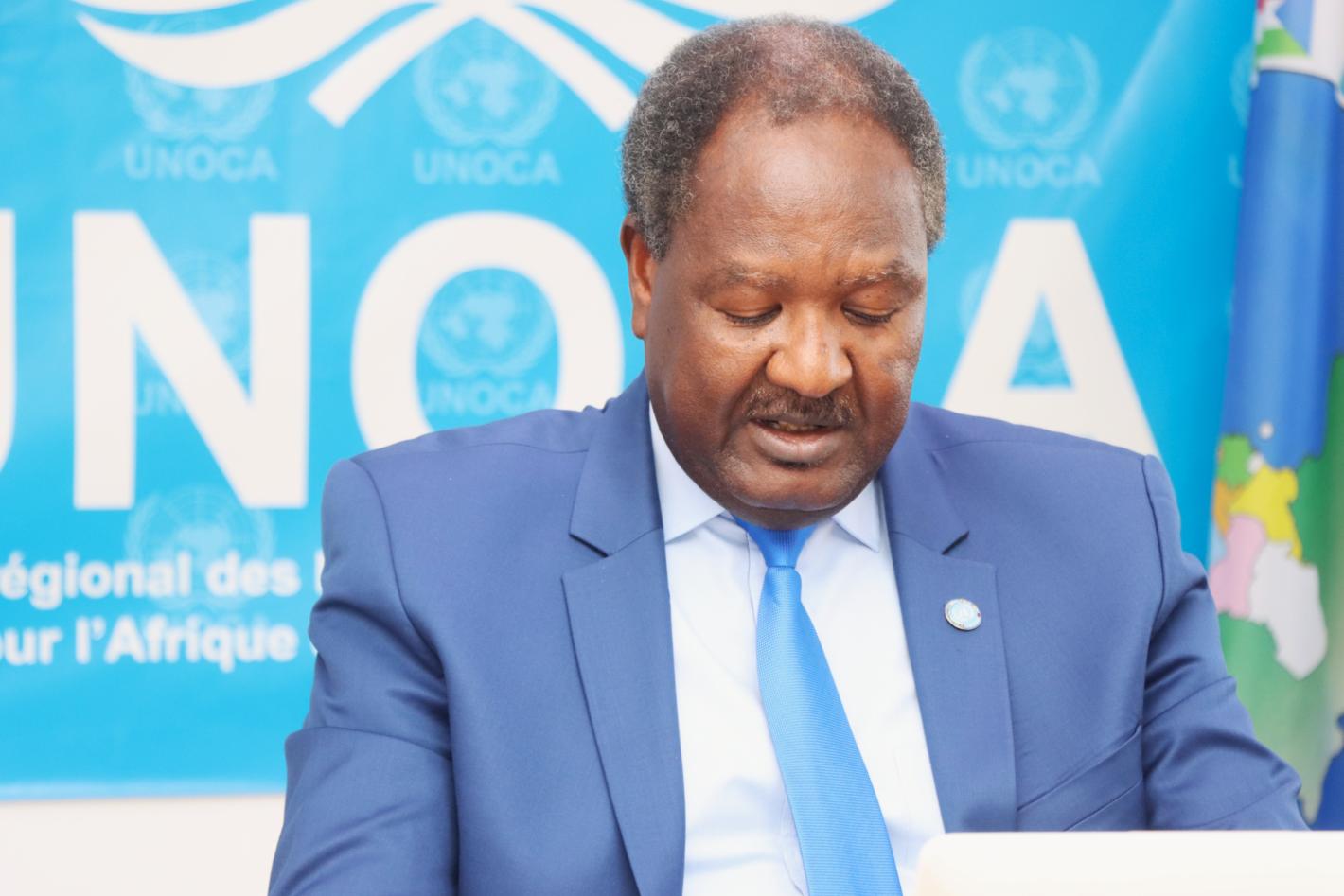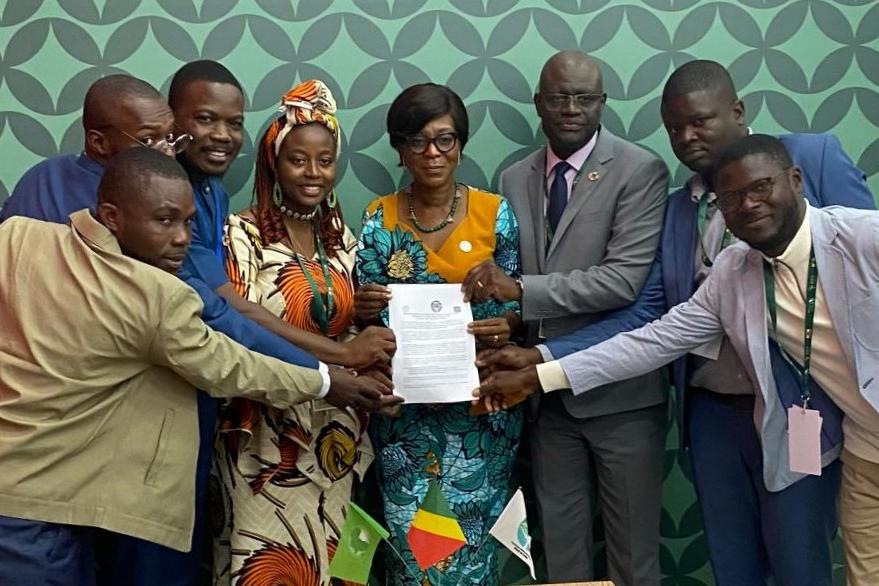An award dedicated to media professionals from Central Africa who engage in the creation, production and publication of content countering hate speech and promoting a peaceful rhetoric will be launched in 2024. This is one of the main conclusions of a regional conference held from 28 to 30 November 2023, in Douala, the economic capital of Cameroon, with a view to evaluating and advocating for effective support for the Regional Strategy to counter hate speech and incitement to hatred and violence. Organized by the United Nations Regional Office for Central Africa (UNOCA) and the United Nations Center for Human Rights and Democracy in Central Africa with the support of the Cameroonian government, this meeting brought together about twenty journalists, bloggers and civil society representatives involved in this process for more than two years. The launch of an “award against hatred” is in fact the translation into reality of one of the main recommendations of a Regional Forum that Douala had already hosted in October 2021, which focused on raising awareness and building the capacity of the media and communication regulatory bodies on the prevention of conflicts linked to hate speech and the fight against this phenomenon in Central Africa.
The involvement of professional organizations
In the Douala Declaration, adopted at the end of the meeting on 30 November 2023, the participants underline that “this Prize should make it possible to assess the ability of media professionals not only to master the six Rabat principles but also to grasp the link between freedom of expression and hate speech, knowing that ‘addressing hate speech does not mean limiting or prohibiting freedom of speech but keeping hate speech from escalating into more something more dangerous, particularly incitement to discrimination, hostility and violence, which is prohibited under international law'.” They express the hope that it will be awarded as part of the events marking the International Day for Countering Hate Speech, established by resolution 75/309 of 21 July 2021 of the UN General Assembly and celebrated each year on 18 June. CNUDHD-AC was tasked with working in collaboration with UNOCA and UNESCO to define the related criteria. This project will also be implemented in close coordination with all other stakeholders, including the “Platform of organizations of media professionals for peace and sustainable development in Central Africa” (PROMEDAC), created in 2021, and whose members present in Douala showed a real determination to revitalize this association working against the spread of hate speech in the media and on social networks.

Cameroon indicated that it welcomed the idea of this prize. Speaking on behalf of the Minister of External Relations, Simon Pierre Omgba Mbida, Minister Plenipotentiary, Head of the Protocol and Consular Office in Douala, noted that the government would pay particular attention to all the recommendations. He promised that the recommendations would be brought to the attention of the Regional Forum of Ministers of Communication and Information of Central Africa, to be held on 14 and 15 December 2023, in Bangui, the Central African Republic (CAR). The stakes of the said Regional Forum were summarized by the Head of the Strategic Communication and Public Information Unit of UNOCA, Norbert N. Ouendji: prior to its political endorsement and effective adoption by relevant authorities of the Community Economic Affairs of Central African States (ECCAS), the Regional Strategy and Action Plan to address and counter hate speech would be examined and pre-validated. Discussions will focus in particular on the version amended by the Member States of the United Nations Permanent Advisory Committee on Security Issues in Central Africa (UNSAC) during an ad hoc meeting held in Yaoundé from 5 to 7 July 2023. The UNSAC focal point at the Cameroonian Ministry of External Relations, Lasconi Moungui Medi, recalled its importance and main points.

Participants lauded the process that contributed to the development of the said Strategy. They noted with satisfaction that it was the result of inclusive and participatory consultations organized as part of the awareness-raising Forums held in Douala, Cameroon, from 26 to 29 October 2021, in Bangui, CAR, from 26 to 29 April 2022, in Kinshasa, the Democratic Republic of Congo (DRC), from 21 to 24 June 2022, and in Yaoundé, Cameroon, from 5 to 7 July 2023, with the support of the ECCAS Commission, UNOCA, CNUDHD- AC, the UN Joint Human Rights Office in the DRC (UNJHRO), the UN Stabilization Mission in the DRC (MONUSCO), the UN Multidimensional Integrated Stabilization Mission in CAR (MINUSCA), the UNESCO Central Africa Office, the UN Office for the Prevention of Genocide and the Responsibility to Protect and the International Organization of the Francophonie.
The imperative to deconstruct hate speech in the sub-region
“Our wish is to see [this] project of the Strategy and its Action Plan transformed into a real operational instrument,” pleaded Minister Plenipotentiary Simon Pierre Omgba Mbida, reaffirming his country's determination to assume and deliver on the mandate entrusted to it in this regard by UNSAC. In his speech at the closing of the proceedings, the Director of the UN Center for Human Rights and Democracy in Central Africa, Nouhoum Sangare, reiterated the support of the Organization for the ongoing efforts, explaining that it was “more urgent than ever to deconstruct hate speech in the sub-region.” He noted that the consequences of this scourge could be “devastating and lead to serious violations of human rights and humanitarian law.” To avoid such situations, details of which were presented during a specific session led by a specialist from the Center (Fonyuy Kiven), he strongly encouraged media professionals to fully play their role of preventing and educating the citizens, which are essential factors in the response to this phenomenon.

In addition to Cameroon, CAR, Chad, Congo, Gabon, Equatorial Guinea, and Sao Tome and Principe were represented at the regional conference in Douala. For administrative and logistical reasons, the other ECCAS countries invited at the event (Angola, Burundi, DRC and Rwanda) were unable to participate. The Director of the UN Center for Human Rights and Democracy in Central Africa regretted this situation beyond the control of the organizers and their partners, and announced that there would be “certainly another opportunity to come together around this same subject" - that related to addressing and countering hate speech in Central Africa.




